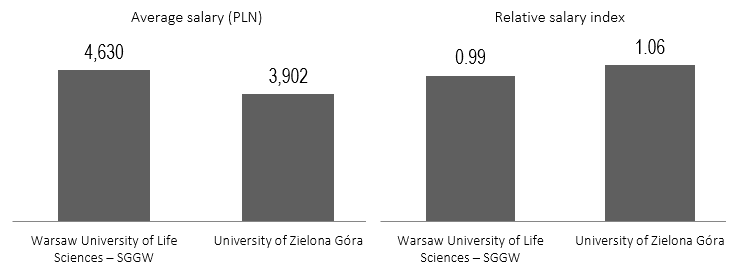
Poland is an economically diversified country, which has a significant impact on how much university graduates can earn. It is commonly believed that graduates of Warsaw-based universities will earn more than their counterparts who graduated from higher education institutions in small towns. Is this really the case?
Labour market success, including financial success, depends on many factors, some of which are not related to the quality of education or the university one has graduated from. Therefore, in order to obtain a fairer assessment of individual universities and study programmes in this respect, it is a good idea to eliminate these factors in the analysis. In this way, universities will not be ‘punished’ or ‘rewarded’ for factors that are beyond their control. Universities located in less developed regions will therefore no longer be unduly accused of offering lower quality of education.
One solution that factors in the local labour market conditions in the analysis of the life trajectories of graduates is applied in the National System of Monitoring the Economic Trajectories of Graduates (ELA). This solution consist in using relative indicators, including the relative salary index. How is it calculated? For the months in which a graduate was employed, the county (poviat) of residence is determined, and then the average earnings in that county are checked for that month, and the average earnings are calculated. The resulting figure is the average earnings in the counties of residence during the months worked. The final result is obtained by dividing graduates’ earnings by the average earnings in their place of residence. In fact, this juxtaposes earnings of each studied individual with earnings of their ‘statistical neighbours’.
Figure 1 below illustrates the usability of the relative salary index. It presents absolute and relative earnings of graduates who obtained a degree in computer science in a full-time second cycle programme at two selected universities.

Although the graduates of the Warsaw University of Life Sciences (SGGW) undoubtedly earn more, the graduates of the University of Zielona Góra are richer than their fellow residents. One might expect that a significant proportion of SGGW graduates live in or around Warsaw, which is generally a more affluent region, where it is easier to find a well-paid job. On the other hand, taking into account the local labour market, one can see that a degree from the University of Zielona Góra offer relatively better conditions on the local labour market than a degree from the SGGW in Warsaw. An average holder of a computer science degree from UZG earns slightly more on average than their neighbours, whereas SGGW graduates earn somewhat less.
In addition to the relative salary index, the ELA system also uses a relative unemployment rate. Both indicators are innovative and not found in the literature or in graduate monitoring systems in other countries.
Readers are encouraged to read more on relative indicators, their design, properties and applications in the forthcoming article entitled "Tyle samo, ale nie tak samo. Wskaźniki względne w badaniach losów absolwentów uczelni" [The same, but not the same. Relative indicators in the study of life trajectories of university graduates], soon to be published in the Edukacja[1] quarterly.
[1]: Bożykowski M., Jasiński M., Zając T., Żółtak M. (2018). Tyle samo, ale nie tak samo. Wskaźniki względne w badaniach losów absolwentów uczelni, “Edukacja” (in print).